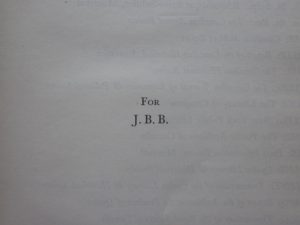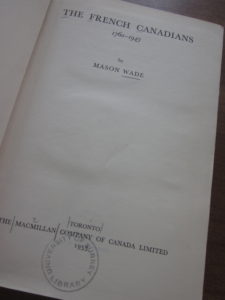The several million Americans of French or French-Canadian origin, who are among the oldest Americans of European stock, are for the most part human vestiges of the vast continental French empire in North America.
Thus began historian Mason Wade’s essay on Franco-American history in The New Catholic Encyclopedia, published a half-century ago.
In the 1950s and 1960s, few scholars could match Wade’s ability to do justice to French-Canadian diaspora. His work on these populations evinced on his part an empathetic desire to learn and understand which, until then, had seemed impossible among English speakers. In fact, by writing in English, he often played the part of an intercultural broker.
Wade’s conceptual insights and the accomplishments he notched over the course of a forty-odd-year career earned him recognition on both sides of the border. In 1964, he succeeded Marcel Trudel to become the first American to serve as president of the Canadian Historical Association.

The roots of Wade’s interests and cultural sensitivity, which might seem overrated by twenty-first-century standards, were many: his Catholic upbringing in a sea of Protestants; the influence of John Bartlet Brebner’s transnational studies; his fine work on historian Francis Parkman; and his time at Université Laval in the 1940s. His extensive research was manifest in the most important work of his career, The French Canadians, 1760-1945, issued by Macmillan in 1955.
In Franco-American history, his article on the nineteenth-century national parish system, which appeared in the pages of the Catholic Historical Review in 1950, remains an important study.
Wade’s scholarly output was significant; so was his impact as a teacher. As the head of the Canadian Studies Program at the University of Rochester, he influenced students who would in turn become renowned teachers and scholars—H. Nicholas Muller, Cameron Nish, George Rawlyk, Yves Roby, and Claude Thibault among them. There is, then, a paradox in the relative invisibility of Wade’s work in our present historiographical conversations. Enduring national paradigms may be to blame.

As it grows, this blog will bear the unmistakable imprint of Wade’s work. It will be transnational in scope. It will transcend conceptual and cultural barriers. And, certainly, it will be concerned with vestiges.
But its stated mission is not to advocate. It is to understand.
Many researchers are already engaged in this endeavor. Among online resources, the blogs of Vicky Lapointe, Juliana L’Heureux, James Myall, and David Vermette are splendid examples. As the body of scholarship in Franco-American studies expands in new and exciting directions—and takes full advantage of possibilities unimagined by Wade—I hope my blog will come as a valued addition to the conversation.
Leave a Reply